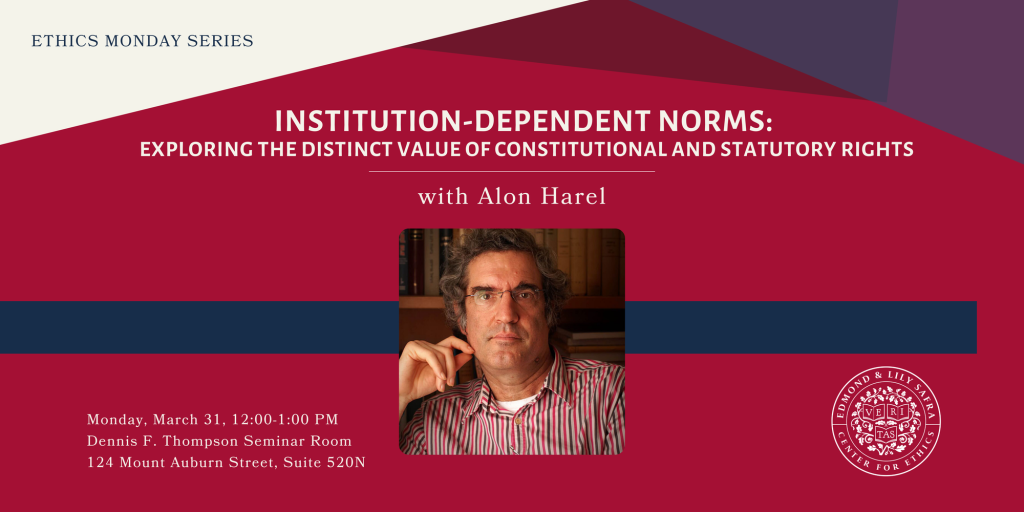
Join us for Ethics Monday as we welcome Alon Harel, Mizock professor at the law faculty at the Hebrew University. Harel will lead the audience through his essay, “Institution-Dependent Norms: Exploring the Distinct Value of Constitutional and Statutory Rights,” in which he dives into the debate between constitutionalism and democratic majoritarianism, exploring how judicial review impacts democracy.
Available in-person or via zoom. Registration is required. A light lunch will be served.
REGISTER HERE.
About “Institution-Dependent Norms: Exploring the Distinct Value of Constitutional and Statutory Rights”:
The conflict between advocates of constitutionalism and advocates of democratic majoritarianism has been at the center of attention. The charge that the judiciary is too politicized and that judicial review undermines democracy figure prominently in public debates.
In this essay, Harel maintains that both constitutional provisions—norms that are not dependent on our choices—and statutory provisions—namely, norms that are contingent on our choices—are necessary features of a liberal democracy. He makes the case for institution-dependent goods, arguing that some goods depend for their existence on being produced by the right law-making institution.
Harel differentiates among three types of demands: universal obligations, fundamental commitments, and choices. Constitutional law-making is necessary to convey our shared recognition that certain norms, such as fundamental rights and core commitments are binding independently of our will. Hence, contrary to the prevalent position of political theorists, processes of majoritarian decision-making undermine rather than reinforce their value. By contrast, the statutory form conveys the recognition that certain norms provide goods whose value depends on majoritarian procedures. Hence, constitutional and statutory norms are not mere means to create just norms whose value is independent of the institution in charge of creating them. Instead, the value of such norms hinges on the institution creating them.
This account has important theoretical and doctrinal implications. Theoretically, Harel establishes that institutions are not merely vessels through which norms get public recognition. The goods that legal norms provide are institution-dependent goods, namely, goods whose effective provision depends on the institutional processes that bring these norms into being. Doctrinally, he establishes that choosing one or another institution to entrench a norm should not be governed (exclusively) by pragmatic considerations; there are principled considerations that should guide the state and govern its decision to render a norm constitutional or statutory.
Download and read the paper here.
About Alon Harel:
Alon Harel is a Mizock professor in the law faculty at the Hebrew University and a member of Federmann Center for the Study of Rationality. Professor Harel was a visiting professor at Columbia Law School, Chicago Law School and University of Texas. He was also a also a fellow at the Ethics Center at Harvard, the Ethics Center at Toronto and at the Wissenschaftkolleg in Berlin His areas of research include moral, political and legal philosophy, criminal law, law and economics, and human rights. In recent years he developed and refined a theory which perceives law to be of intrinsic rather than instrumental value. Under this view, the desirability of legal and political institutions is not contingent; such institutions are necessary for the realization of valuable ends. His books include Why Law Matters (OUP, 2014); Reclaiming the Public (CUP, 2024).

